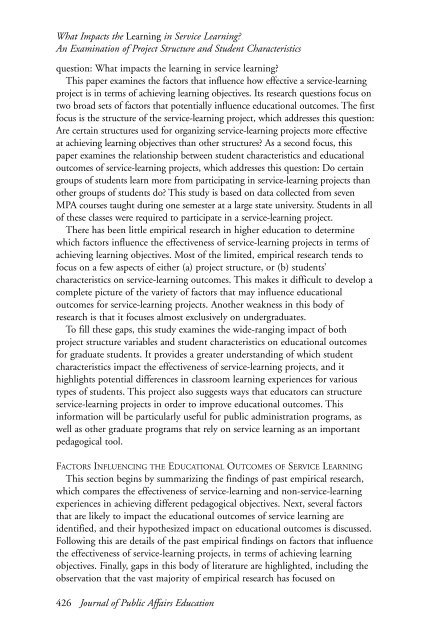JOURNAL OF PUBLIC AFFAIRS EDUCATION - National ...
JOURNAL OF PUBLIC AFFAIRS EDUCATION - National ...
JOURNAL OF PUBLIC AFFAIRS EDUCATION - National ...
You also want an ePaper? Increase the reach of your titles
YUMPU automatically turns print PDFs into web optimized ePapers that Google loves.
What Impacts the Learning in Service Learning?<br />
An Examination of Project Structure and Student Characteristics<br />
question: What impacts the learning in service learning?<br />
This paper examines the factors that influence how effective a service-learning<br />
project is in terms of achieving learning objectives. Its research questions focus on<br />
two broad sets of factors that potentially influence educational outcomes. The first<br />
focus is the structure of the service-learning project, which addresses this question:<br />
Are certain structures used for organizing service-learning projects more effective<br />
at achieving learning objectives than other structures? As a second focus, this<br />
paper examines the relationship between student characteristics and educational<br />
outcomes of service-learning projects, which addresses this question: Do certain<br />
groups of students learn more from participating in service-learning projects than<br />
other groups of students do? This study is based on data collected from seven<br />
MPA courses taught during one semester at a large state university. Students in all<br />
of these classes were required to participate in a service-learning project.<br />
There has been little empirical research in higher education to determine<br />
which factors influence the effectiveness of service-learning projects in terms of<br />
achieving learning objectives. Most of the limited, empirical research tends to<br />
focus on a few aspects of either (a) project structure, or (b) students’<br />
characteristics on service-learning outcomes. This makes it difficult to develop a<br />
complete picture of the variety of factors that may influence educational<br />
outcomes for service-learning projects. Another weakness in this body of<br />
research is that it focuses almost exclusively on undergraduates.<br />
To fill these gaps, this study examines the wide-ranging impact of both<br />
project structure variables and student characteristics on educational outcomes<br />
for graduate students. It provides a greater understanding of which student<br />
characteristics impact the effectiveness of service-learning projects, and it<br />
highlights potential differences in classroom learning experiences for various<br />
types of students. This project also suggests ways that educators can structure<br />
service-learning projects in order to improve educational outcomes. This<br />
information will be particularly useful for public administration programs, as<br />
well as other graduate programs that rely on service learning as an important<br />
pedagogical tool.<br />
FACTORS INFLUENCING THE <strong>EDUCATION</strong>AL OUTCOMES <strong>OF</strong> SERVICE LEARNING<br />
This section begins by summarizing the findings of past empirical research,<br />
which compares the effectiveness of service-learning and non-service-learning<br />
experiences in achieving different pedagogical objectives. Next, several factors<br />
that are likely to impact the educational outcomes of service learning are<br />
identified, and their hypothesized impact on educational outcomes is discussed.<br />
Following this are details of the past empirical findings on factors that influence<br />
the effectiveness of service-learning projects, in terms of achieving learning<br />
objectives. Finally, gaps in this body of literature are highlighted, including the<br />
observation that the vast majority of empirical research has focused on<br />
426 Journal of Public Affairs Education

















